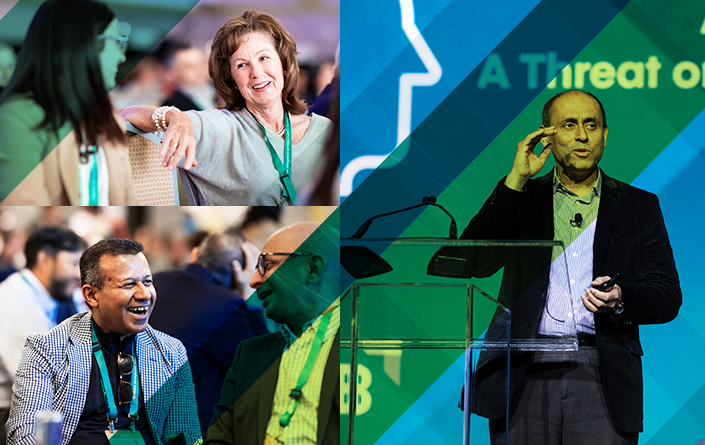AACSB Member Voices: Kendra Chen
In this blog series, we reach out to individuals involved in AACSB's Business Education Alliance to garner their personal perspectives on business education. We ask educators and practitioners about their professional journey and any insights they can share related to the future of our industry. In this interview, Kendra Chen, of Tongji University, discusses her entrance into the accreditation space and the value she found in being a part of a global network of educators and professionals passionate about business education.
Please introduce yourself and tell us how you became involved in accreditation.
I am currently the senior manager of international cooperation and accreditations at the Tongji University School of Economics and Management (SEM). I joined the school in 2008 upon graduating from Shanghai International Studies University with my master’s in applied linguistics. Coincidentally, that was the same year SEM started their accreditation process. To ride that wave, SEM executed its upgraded internationalization strategy together with three other strategies in which staff are required to be proficient in English, and all new faculty are required to hold overseas PhDs.
Accreditation was then extensively promoted within the school and in 2009, SEM established its International Accreditation Office, which was reorganized in 2017 to become the International Cooperation and Accreditation Office.
When was the first time you learned about AACSB?
It was in 2008 when I first learned about AACSB. Actually, SEM had been following international accreditations for business education worldwide since 2005. During that year, the current deputy dean in charge of international cooperation and accreditations participated in a joint event with AACSB and EFMD in San Diego. The top management of SEM was at that time visionary to foresee that internationalization and accreditation would lead a significant movement of domestic business schools. As a matter of fact, foresight and action both came to be very important.
How does AACSB membership help you meet your school’s mission and objectives?
Generally speaking, the standards of accreditation could serve as a blueprint for schools to align their activities with global good practices and narrow their gaps with leading business schools. But from my point of view, AACSB deserves more credit in its mission to foster engagement, accelerate innovation, and amplify impact in business education.
Business is very different from philosophy, literature, or history. A crucial feature of business is its era-defining character and natural bond the society. Therefore, I believe it’s the economic development stage that decides the general mission of business education.
In light of that, the mission of Tongji SEM has three objectives: to create management knowledge, to develop leading professionals, and to address the challenges of business and society. In order to address the challenges of business and society, we have focused our distinctiveness on four signature disciplines: project management, urban management, service management, and innovation and entrepreneurship, which correspond to the development priorities of the Chinese economy.
In working with AACSB, we found that our objectives were also consistent with its vision to transform business education for global prosperity. Therefore, in pursuit of accreditation, we are inspired by AACSB to be more mission-driven in achieving our strategic goals, and persistent in continuously improving.
What value(s) have you gained from being a part of the AACSB network?
Apart from quality and diversity, the most important values we’ve gained from being a part of AACSB are sharing insights and learning from each other.
AACSB organizes a variety of learning and development opportunities for member schools to learn from other schools worldwide. The process itself is a sustainable cycle, as new members who learn from today’s subject matter experts will soon grow and become the the experts and sharers of tomorrow. Additionally, accreditation is never the end goal, as there are always new and inspiring things to learn.
From knowing little about accreditation to a becoming a sharer of best practices, Tongji SEM has been empowered by the AACSB network to benefit other schools. During the past three years, SEM has been invited to share strategies, policies, and practices on topics including sustainable development and social responsibility, how impactful applied research informs curriculum management and assurance of learning, and how to encourage greater business and societal impact. Additionally, a number of schools have reached out to SEM to exchange ideas and learn from us.
What would be your advice for business schools who are considering AACSB membership?
The shortest answer is to go for it. You will be quickly amazed by this organization. As Tongji SEM became a member of AACSB in 2009, we began to attend its meetings, ranging from accreditation-related seminars to the regional Asia Pacific annual conferences to the International Conference and Annual Meeting. And with an increasing number of digital offerings, learning and connecting is very convenient.
From those thematic seminars we got hands-on information on how to manage accreditation processes from scratch. In the AACSB network, you’ll find peers who are in your same position as well as longtime members who are generous in sharing their knowledge and best practices. Moreover, AACSB has a well-developed support system, including staff liaisons, mentors and a peer review team chair. As I said, foresight and action are both important, which contributes significantly to accreditation success.
Who has served as an inspiration to you during your career?
There are many people who have played important roles in my career, but as for my engagement with AACSB, Julie Perrin-Halot, associate dean and director of the Quality Centre at Grenoble Ecole de Management, occupies a special place. I met with her in 2011 when the accreditation work at SEM had gained good momentum and was approaching its busiest time.
From 2011 to 2015, Julie continuously provided professional advice on accreditations to us, including how to develop processes and how to sharpen the reports. My inbox still contains more than 300 emails we’ve exchanged during that time. She was extremely busy herself, but she always found time to support us. At one particular moment, she told me she was working on multiple accreditation projects at Grenoble, which created a huge amount of work for her; however, she never stopped helping us. I marveled at her dedication.
Later Julie became a mentor and peer reviewer and continued to travel and have many interesting experiences at different schools. In 2014, she officially became the AACSB mentor for Tongji SEM. Under her guidance, SEM successfully entered the self-assessment stage and finally obtained AACSB accreditation in 2016.
As a professional, she’s straightforward and sincere, well-organized, and extremely diligent in her work, while as a colleague she’s caring, thoughtful, and unselfish. From Julie, I learned to be more persistent, dedicated, and professional. I stopped complaining about too much work, because it just takes time. In actuality, we can do more, become better, and help more people.
In addition, I would like to express my gratitude to professors Jerome Bon and Dusan Mramor, whose help and advice have benefited me greatly.





